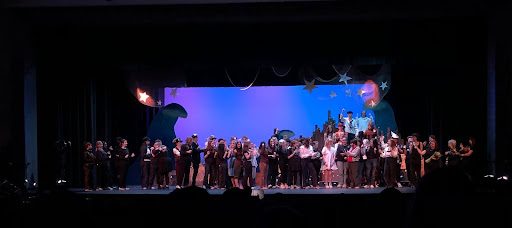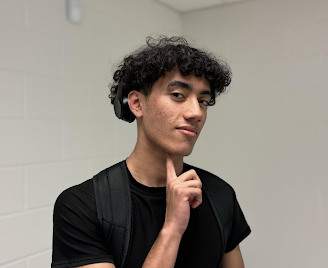
The annual Winter One-Acts put on by Spartan Theatre are a collection of short, student-written and directed performances. Despite not being one of the two mainstage productions that receive more attention, all groups involved in the process share admiration.
The One-Acts, this year with a slate of nine, are written by students in Theatre Arts 3 and 4. The first stage is the writing process, which every student does as a grade from theatre teacher Maeve Nash.
“At first I was going to [use] a previous idea that I had,” said junior Brianna Turner, a playwright and dramaturg for “Grow the Hell Up!”. “But then Ms. Nash told us that it’s better to have an idea at the moment, not one from the past year. We had to go through this whole process of connecting [random words] to a whole story.”
From the mandatory writing, students can decide whether they would like to submit their one-act to be performed. Playwrights can also choose whether they would like to be a dramaturg, a guiding figure in rehearsals per their script, which most do.
“Honestly, it’s a little bit bizarre,” said Turner on watching her one-act come to life. “I am kind of distant from it. I don’t compute that it’s mine, that I wrote this just a few months ago.”
Students in Theatre Arts 3 and 4 can also apply to be a director and be paired to a script. Director students start with an imaginary budget of $1,000 and first use it on script bidding in an auction-like meeting.
“It was overwhelming, I won’t lie,” said junior Ash Virts, who directs “The Undeath”. “You’re trying to figure out who wants [which script] and what they’re willing to pay for it, and you’re trying to figure out how to get what you want. That doesn’t mean it’s not fun though.”
Once playwrights and directors are paired, casting the acts comes into play. Actors sign up to audition with one dramatic and one comedic monologue in front of all directors, dramaturgs, and Nash. This format makes for a unique experience.
“I think for anyone who’s doing One-Acts for the first time, it’s very intimidating,” said sophomore Olive Han, who performs in “Balanced/Unbalanced”. “You don’t know anyone, but it’s a bigger group, so you feel like you have to impress them more.”
Although said to be intimidating, there are some bonuses to the audition process.
“It was really low-key, which I thought was nice, especially since this is a pretty new thing for me and other people,” said freshman Liz Garcia Di Benedetto, who performs in “Hymn of the Velvet Siren”.
Then comes callbacks. Directors choose who they want to call back to read for a part and gauge if they want to cast them. Actors are not limited to receiving a single offer. Some achieve multiple.
“Callbacks for One-Acts [can be] insane if you get [multiple offers] because you run around [to] a lot of different places,” said Han. “If you get called back for every [act] in one time slot, you run around, but you only get to [read for the part] for like fifteen minutes.”
Still, though, comfort remains for some in the frantic running around.
“It was so fun to go to different rooms and be able to play different characters. I really liked the environment too; everyone was really supportive and nice,” said Garcia Di Benedetto.
Once the acts are cast via an actor-bid auction similar to script bidding, next comes rehearsing them.
“I’m not gonna lie, the rehearsal process isn’t easy, but it is so much fun,” said junior Dia Tafilaj, who directs “Now You Don’t See Me”. “Getting to work with actors and having them perform a vision that you have in your head and see that vision come to life is something that I find so amazing about directing.”
The Winter One-Acts are a unique theatre experience that cannot be found in the other yearly shows.
“What makes the One-Acts so unique is how personal of an experience it can be. When you’ve developed a close relationship with your actors, it makes the experience,” said Virts.
Performed in the theatre class black box to a smaller audience, more closeness and comfort arise for performers. All in all, the One-Acts may not get as much love, but they allow for a display of enjoyment and imagination.






